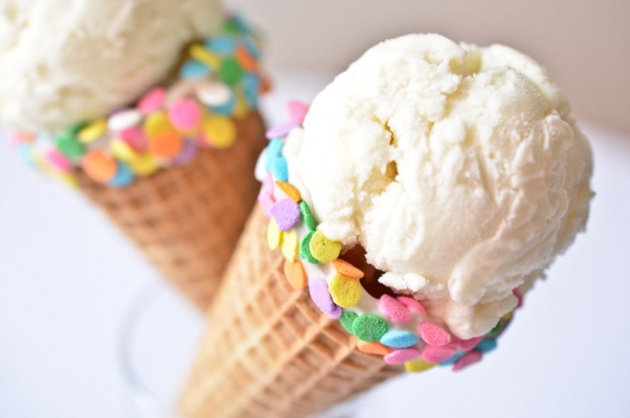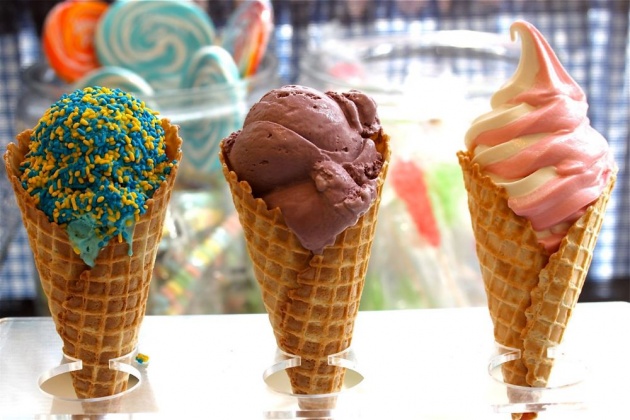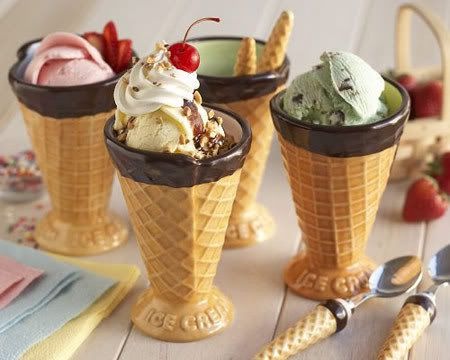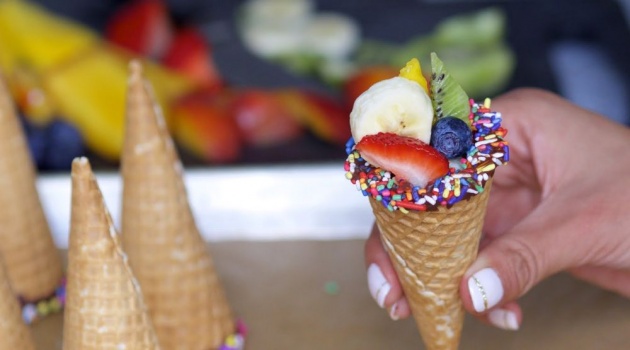 1. Ice cream as we know it seems to have emerged in 17th-century France. (A first-century Roman emperor is said to have sent runners into the mountains for snow to be flavored with juices. In the 13th century.
1. Ice cream as we know it seems to have emerged in 17th-century France. (A first-century Roman emperor is said to have sent runners into the mountains for snow to be flavored with juices. In the 13th century.
2. Marco Polo brought back from China descriptions of a sherbet dessert.
3. The cone didn't appear until 1904, when a Syrian waffle maker at the St. Louis World's Fair began rolling his pastries into horns to help an ice cream vendor who had run out of dishes.
4. The idea of the ice cream cone had been patented a year earlier, in 1903, by an Italian in New York City, but the fair popularized it.
5. Today the average American eats about 20 quarts of ice cream a year―the world's highest per capita consumption, according to the International Dairy Foods Association.
6. Top-selling ice cream flavors are: vanilla, with 33 percent of the market, and chocolate, with 19 percent.
7. It takes 5.8 pounds of whole milk and one pound of cream to make one gallon of ice cream.
8. Farmers in Vermont used to feed leftovers provided by Ben and Jerry's to their hogs. The hogs didn't seem to care for Mint Oreo Cookie.
9. The largest ice cream cone measured 2.81 m (9 ft 2.63 in) in height and was achieved by Mirco Della Vecchia and Andrea Andrighetti of Italy.
10. Some weird flavors of ice cream include buckwheat ice cream, beer flavored ice cream, and parmesan gelato.
11. June is the month that the most ice cream is produced.
12. The central region of the U.S. created the most production of ice cream and related frozen products.
13. California produces the most ice cream in America.
14. Chocolate syrup is the world’s most popular ice cream topping.
15. 87% of Americans have ice cream in their freezer at any given time.
16. It takes about 50 licks to finish a single scoop ice cream cone.
17. The perfect temperature for scooping ice cream is between 6 and 10 degrees Fahrenheit.
 18. “Brain Freeze” occurs when ice cream touches the roof of your mouth.
18. “Brain Freeze” occurs when ice cream touches the roof of your mouth.
19. 1 out of 5 people share ice cream with their pet.
20. An average dairy cow can produce enough milk in her lifetime to make a little over 9,000 gallons of ice cream.
21. In the U.S., all ice cream needs to have a minimum of 10% milkfat if it is to be labeled "ice cream". This includes custard based (French Style) ice creams.
22. The U.S. celebrates National Ice Cream Month in July.
23. The U.S. produces the most ice cream in the world.
24. Ice cream became available to the general population in France in 1660.
25. Americans celebrated the victory of WWII with ice cream. In 1946, they ate more than 20 quarts of ice cream per person.
26. Hawaii has a fruit known as the ice cream bean or the monkey tamarind that actually tastes like vanilla ice cream!
27. There is actually an ice cream diet designed for weight loss. You can read all about it in Prevention Magazine's paperback, The Ice Cream Diet
28. 19% of Americans say they eat ice cream in bed.
29. 3% eat ice cream in the bathtub.
30. In the early days of television, mashed potatoes were used to simulate ice cream on cooking shows. Real ice cream melted too fast under the heat from the lighting.
31. Missouri designated the Ice Cream Cone as the Official State Dessert in 2008.
32. More ice cream was sold on Sundays than any other day of the week.
33. French ice cream is enriched with egg yolks.
34. At one time it was against the law to serve ice cream on cherry pie in Kansas.
35. The world's first soft-serve ice cream machine was in an Olympia, Washington Dairy Queen.
 36. Rupert Grint’s first ambition was to be an “Ice Cream Man” and he bought an ice cream truck with the money he earned from Harry Potter movies.
36. Rupert Grint’s first ambition was to be an “Ice Cream Man” and he bought an ice cream truck with the money he earned from Harry Potter movies.
37. Ice cream testers use gold spoons to be able to taste the product 100% without a slight percentage of ‘after-taste’ from typical spoons.
38. Clint Eastwood ran for mayor in the city of Carmel in California, campaigning against an ordinance banning the sale of ice cream and he actually won.
39. John Harrison, the official taste-tester for Dreyer’s Ice Cream, has his tongue insured for $1 million.
40. Despite its reputation as a cosmonaut staple, freeze-dried ice cream only made one mission to space. In 1968, it provided instant sugar rushes to the astronauts of Apollo 7.
41. In 1940, scientists concluded that consumption of ice cream was the leading cause of the polio epidemic, solely based on the stats that there were more cases of polio in the summer, which was also when children ate most ice cream.
42. In Canada, more ice cream is sold in the winter months than in the summer.
43. February 4th is the National Ice Cream for Breakfast Day.
44. For TV commercials, “Ice cream sundaes are often constructed of scoops of lard or mashed potato covered in motor oil.
45. Howard Hughes, the millionaire, was fond of Baskin-Robbins’ Banana Ripple ice cream. His ‘helpers’ had to order 200 gallons from the factory before it was discontinued. A few days later Hughes announced that he didn’t like it anymore.
46. Hawaiian Punch was originally an ice cream topping.
47. Eskimo Ice Cream (Akutaq) is made by using a concoction of reindeer fat, seal oil, freshly fallen snow or water, fresh berries and sometimes ground fish. Air is whipped by hand until it cools into foam. Akutaq can also be made with moose, or polar bear meat or fat.
48. “Raw Horse Flesh” is an ice cream flavor that is sold in Japan.
49. The world’s first batch of chocolate chip cookie dough ice cream was made by Ben & Jerry’s, inspired by an anonymous note left on their flavor suggestion board.
50. Ben and Jerry’s has a real physical graveyard in Vermont for retired ice cream flavors.
51. First Lady Dolley Madison served ice cream at the second inaugural ball at the White House in 1813.
52. Ice Cream used to be called cream ice.
53. The Roman Emperor Nero (54-68 A.D.) had ice and snow brought to him from the mountains, which he stored in special rooms under his palace so that he could top it with fruit to enjoy.
54. In 1984, President Ronald Reagan designated July as National Ice Cream Month and the third Sunday of that month as National Ice Cream Day.

55. Around 1800, insulated ice houses were invented and ice cream became an American industry.
56. The first ice cream cone was made by Italo Marchiony in New York City.
57. Did you know that a 125 mL (1/2 cup) serving of regular vanilla ice cream can be a source of nutrients such as calcium and vitamin A?
58. The major ingredient in ice cream is air!
59. The U.S. ice cream industry generates more than $21 billion in annual sales.
60. Some weird flavors of ice cream include maple bacon, beer flavored, and pepperoni pizza.
61. In 1985, the biggest ice cream sundae was made in California. It stood twelve feet tall and was made with 4,667 gallons of ice Cream.
62. A twelve foot tall ice cream sundae could make about 70,000 regular size sundaes. That's a lot of ice cream!
63. Sorbet is like ice cream but contains no milk.
64. Philadelphia native Nancy Johnson patented the first-hand crank churn to make ice cream in 1843, the churn was much faster and produced creamier ice cream than using ice in a bowl, as people had done before.
65. Buffalo, Two Rivers, Ithaca and Evanston all claim to be the birthplace of the ice cream sundae.
66. Former British Prime Minister Margaret Thatcher was part of the team that first invented the method of making soft serve ice cream.
67. Ice cream can be made in many types – ordinary ice cream, frozen custard, frozen yogurt, reduced-fat ice cream, sherbet, gelato, and others.
68. Ice cream recipe came to North America 250 years after it was discovered by Christopher Columbus.
69. Market analysts confirmed that ice cream sales increase many times during times of recession or wars.
70. Ice cream was introduced to America in the 1700's, but mostly enjoyed by those of status and wealth.
71. Centuries ago people started making refreshing summer-time desserts by taking sweet cream (the richest part of milk) or custard (egg-based puddings) and cooling them down with ice.
72. In 1999, it was reported that the good citizens of Omaha, Nebraska, ate more ice cream per person than any other Americans.
73. Among the most unusual flavors of ice cream ever manufactured are avocado, garlic, azuki bean, jalapeno, and pumpkin. Perhaps the weirdest of all: dill pickle ice cream , which was marketed to expectant mothers.
74. Ice cream novelties such as ice cream on sticks and ice cream bars were introduced in the 1920s.
75. Ice cream cones were popularized in America during the 1904 World’s Fair in St. Louis, when an ice cream vendor ran out of cups and asked a nearby waffle vendor to roll up his waffles to hold the ice cream.
76. Under the American Blue Laws of the time, ice cream sodas weren’t allowed to be sold on Sundays. To circumvent this rule, they invented the ice cream sundae.
77. Americans are the No.1 consumers of ice cream in the world, where an average person eats 48 pints of ice cream a year. In total, Americans consumed 1.58 billion gallons of ice cream in 2011.
78. Sugar in ice cream lowers its melting point, and the fats are responsible for its creamy texture.
79. Fat percentage in ice cream is regulated in the United States.
80. About 98% of U.S. families have ice cream in their fridges, at all times.
81. It takes 12 gallons of milk to create one gallon of ice cream.
82. The first ice cream parlor in America was founded in 1776 (The same year our declaration was made).
83. The most expensive sundae is the “Golden Opulence Sundae” at Serendipity 3 in New York, New York at $1000.
84. In ancient Rome, they ate snow and flavored it with fruit and honey as their ice cream.
85. Immigrants at Ellis Island were served ice cream as part of the welcoming to America.
86. About 9 percent of all the milk produced by U.S. dairy farmers is used to produce ice cream.
87. The Beatles had an ice cream flavor named after them by Baskin Robbins called Beatle Nut.



